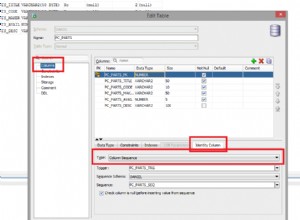t=# create table d(i bigserial, j jsonb);
CREATE TABLE
t=# insert into d(j) select ('{"foreign_data":{
"some_key": '||g||',
"src_data": {
"VEHICLE": {
"title": "615",
"is_working": true,
"upc": "85121212121",
"dealer_name": "CryptoDealer",
"id": '||g||'
}
}
}}')::jsonb from generate_series(1,1222600) g;
INSERT 0 1222600
t=# create index ji on d (cast (j->'foreign_data'->'src_data'->'VEHICLE'->>'id' as int));
CREATE INDEX
para usar esse índice baseado em fn(), você deve "repetir" a função na consulta:
t=# explain analyze select * from d
where cast (j->'foreign_data'->'src_data'->'VEHICLE'->>'id' as int) = 1222551;
QUERY PLAN
------------------------------------------------------------------------------------------------------------------------------
Index Scan using ji on d (cost=0.43..8.45 rows=1 width=215) (actual time=0.021..0.021 rows=1 loops=1)
Index Cond: ((((((j -> 'foreign_data'::text) -> 'src_data'::text) -> 'VEHICLE'::text) ->> 'id'::text))::integer = 1222551)
Planning time: 1.585 ms
Execution time: 0.045 ms
(4 rows)
como você vê, o custo é pequeno e a execução é mais barata do que o índice. mas se você "pular" as formalidades e executar:
t=# explain analyze select * from d
where j->'foreign_data'->'src_data'->'VEHICLE'->>'id' = '1222551';
QUERY PLAN
-----------------------------------------------------------------------------------------------------------------------------
Gather (cost=1000.00..50122.31 rows=6113 width=215) (actual time=335.996..336.000 rows=1 loops=1)
Workers Planned: 2
Workers Launched: 2
-> Parallel Seq Scan on d (cost=0.00..48511.01 rows=2547 width=215) (actual time=223.548..332.213 rows=0 loops=3)
Filter: (((((j -> 'foreign_data'::text) -> 'src_data'::text) -> 'VEHICLE'::text) ->> 'id'::text) = '1222551'::text)
Rows Removed by Filter: 407533
Planning time: 0.096 ms
Execution time: 343.090 ms
(8 rows)
índice não será usado




